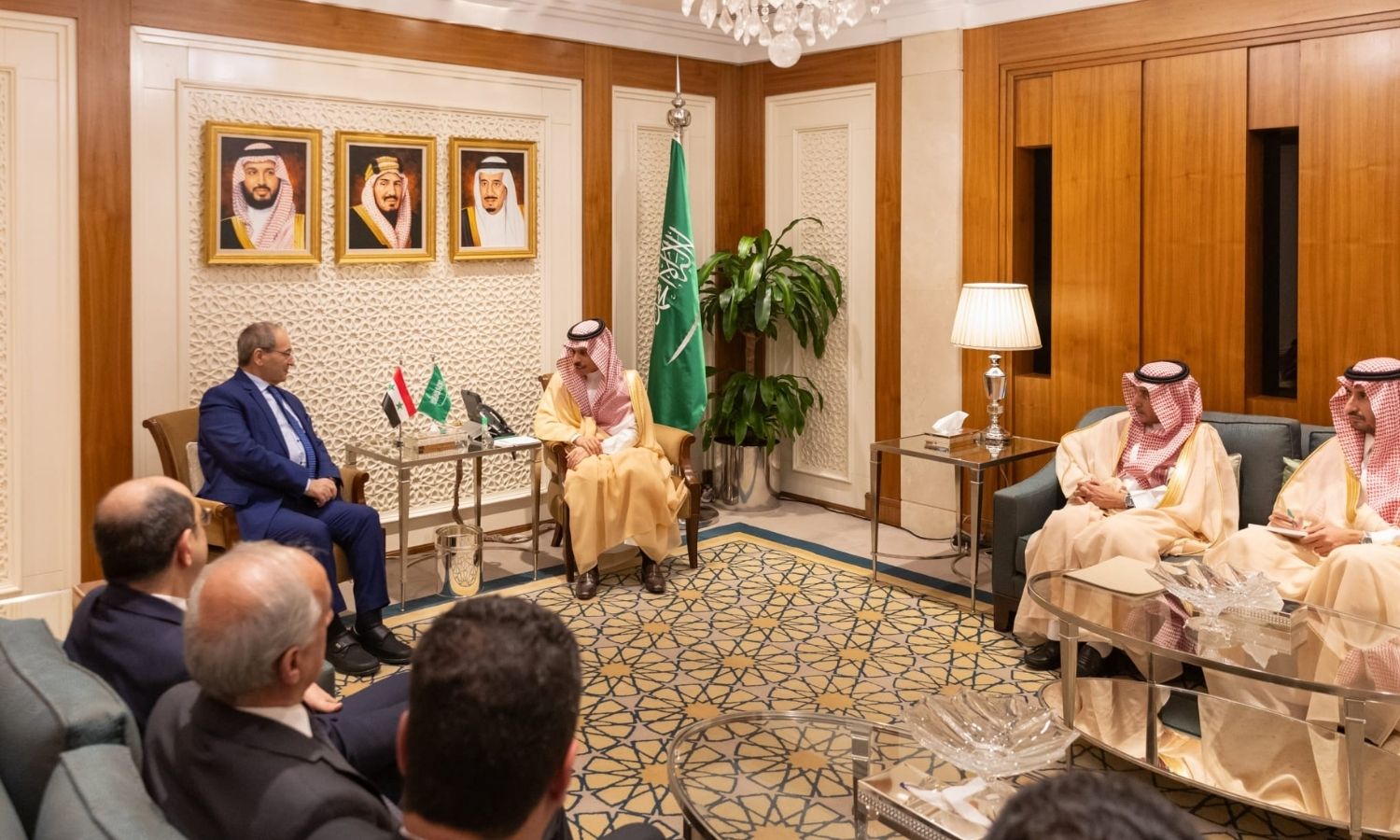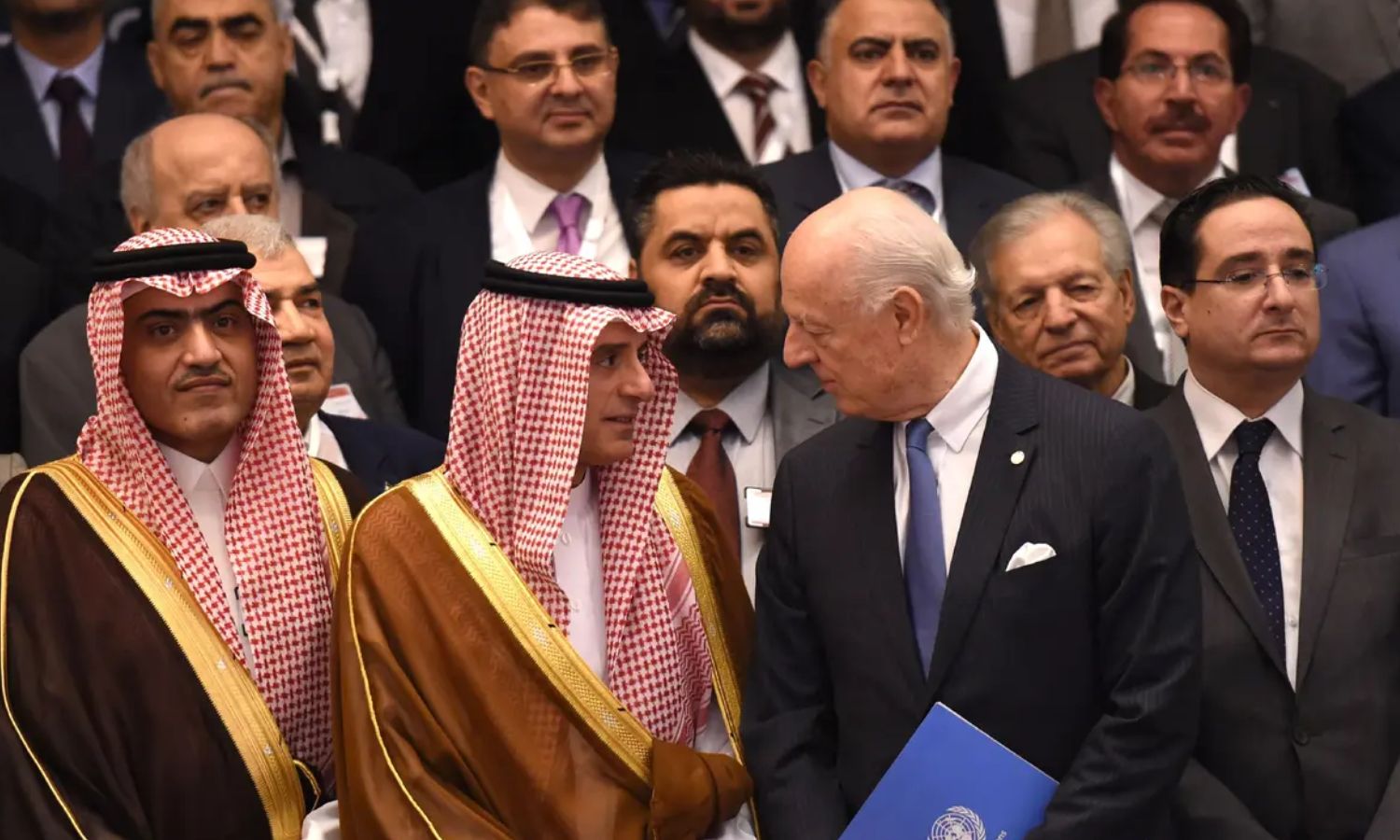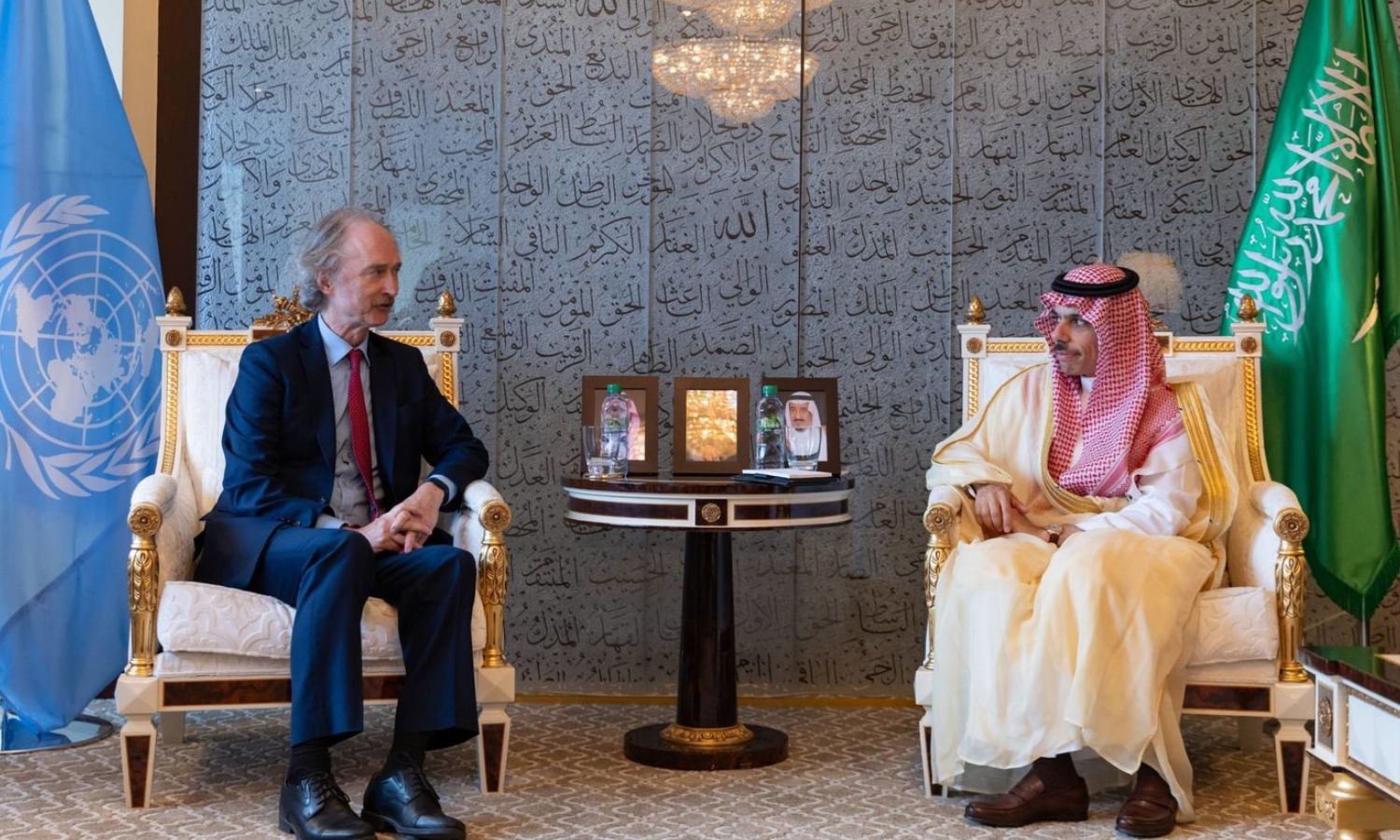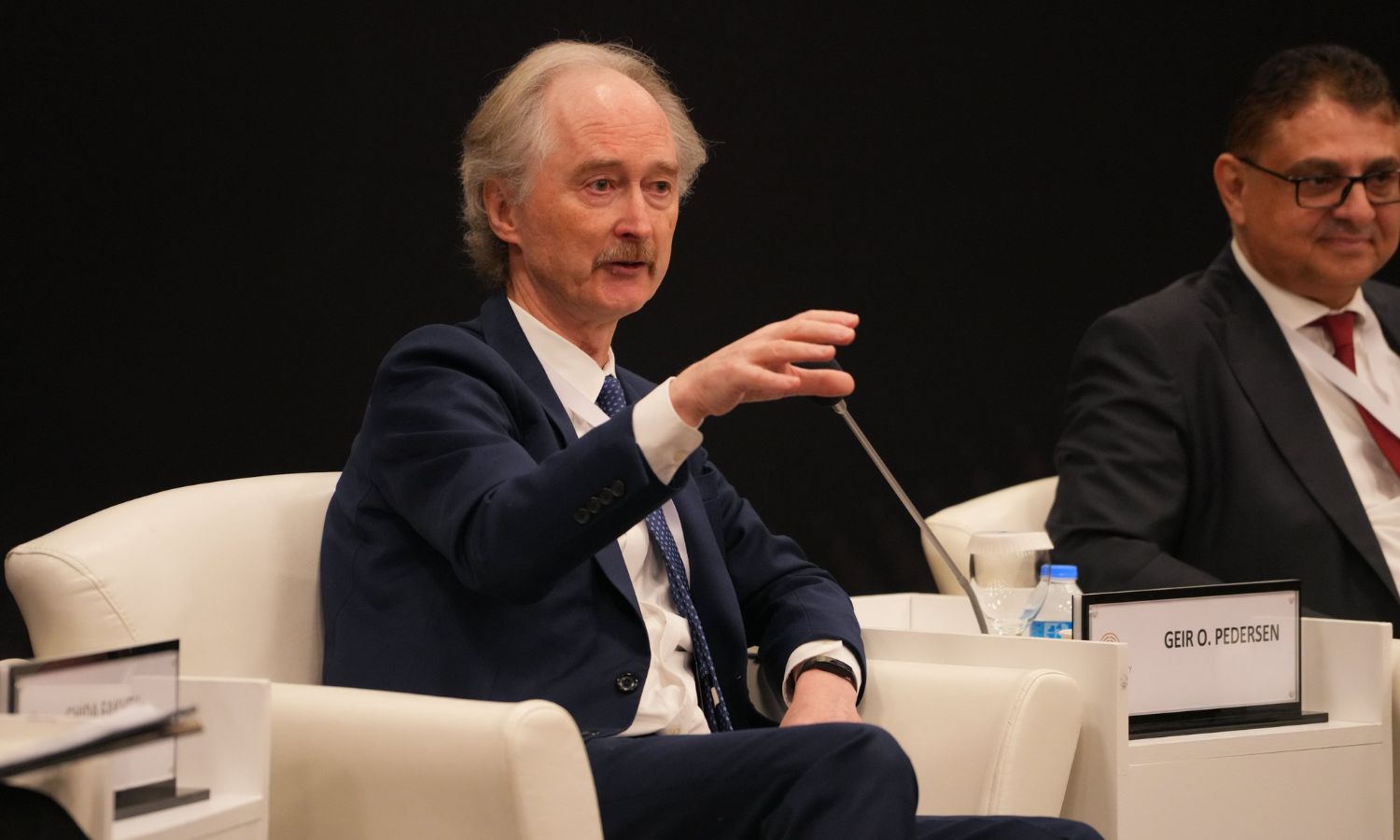


Saudi and Syrian Foreign Ministers meet in Riyadh - March 14, 2024 (Saudi Foreign Ministry/X platform)


Hussam al-Mahmoud | Yamen Moghrabi
Recently, there has been escalating talk about a potential Saudi role in hosting the works of the Syrian Constitutional Committee (SCC), amidst the endeavors of the UN Special Envoy to Syria, Geir Pedersen, to overcome the debate over the venue, which Moscow insisted upon after the eighth round, when Switzerland, which hosts the committee meetings in its second-largest city, Geneva, was considered a party that is no longer neutral in this process, due to its stance opposing the Russian invasion of Ukraine and the resulting measures and positions.
Heading to Riyadh was part of the discussions Pedersen had with the Syrian Foreign Minister, Faisal Mekdad, during his latest visit to Damascus on March 17, where the regime-affiliated newspaper Al-Watan reported from an unnamed diplomatic source in Damascus that Pedersen proposed during his meetings in Damascus that the Saudi capital Riyadh be the venue for these meetings, which could take place if all parties agree.
This statement was followed by a report published by the Asharq Al-Awsat newspaper the next day regarding the stance of the Syrian opposition, represented in this course by the Syrian Negotiations Commission (SNC), where its chairman, Badr Jamous, stated that he had proposed to the United Nations and informed the “brothers in Saudi Arabia” of the Negotiations Commission’s desire for the meetings to be held in Riyadh, which occurred at the inception of the negotiations when there was a rejection of Geneva.
Jamous added, “After that, the Special Envoy proposed Nairobi, and we agreed to that, and currently he has called for Geneva and we also agreed to that.”
In this lengthy report, Enab Baladi discusses with concerned parties and those informed about the Syrian file, the role incumbent upon Saudi Arabia’s potential agreement and the possibility of heading to Riyadh, as well as the future of this political process that has been stalled since June 2022 and has not achieved in its previous eight rounds what surprises Syrians in reality, on the positive path.
When Pedersen met with Mekdad on March 17, the UN envoy touched upon the necessity of resuming the work of the Constitutional Committee, as the current conditions in Syria are linked with the political process, stating, “We all know that to be able to move away from the security challenge and the economic hardship, we need to make progress on the political front, and I’m afraid I have nothing new to report on this matter.”
Pedersen did not receive a public answer or clear stance from the regime regarding the replacement of Geneva with Riyadh, and the Syrian official media ignored the subject of the Constitutional Committee and Pedersen’s call to continue the meetings in Geneva, linking the economic conditions with the political process, with the official Syrian News Agency (SANA) merely highlighting what it described as “facilitations provided by the Syrian government to the United Nations and its offices in Syria.”
The meetings and discussions that revolved around Riyadh suggested discussions of this kind, looking at the timing, as Pedersen’s visit preceded Mekdad’s visit to Saudi Arabia on March 14, to meet his Saudi counterpart, Faisal bin Farhan.
At that time, SANA reported that Mekdad discussed with bin Farhan various aspects of bilateral relations and ways to push and strengthen them, in addition to discussing the latest developments and issues of mutual interest.
The two sides did not hold a press conference at the end of the talks, nor did they issue a joint statement about what was discussed or agreed upon, with separate statements also absent.
Additionally, on March 25, Pedersen conducted a phone call with the Saudi Foreign Minister, during which they discussed the latest updates on the situation in Syria at various levels, and the efforts being exerted towards solving the Syrian crisis, according to the Saudi Foreign Ministry.

An expanded meeting for the Syrian opposition bodies at the “Riyadh 2” conference – November 22, 2017 (Reuters)
Despite the absence of an official Saudi stance and the lack of any declarations regarding the possibility of hosting the Constitutional Committee’s work, the nature of the Saudi Kingdom’s political relationships with all the parties concerned with continuing the path does not make it a difficult choice.
Since the earthquake of February 6, 2023, the relations of the Saudi Kingdom with the Syrian regime have taken a distinct shape from what it has been over more than a decade when political ties were publicly severed and its ambassador was withdrawn from Damascus, a step taken by many Arab countries in 2012 due to the Syrian regime’s repressive approach to street protests demanding its departure.
During this time of rupture, Saudi Arabia hosted the “Riyadh 1” conference on December 10, 2015, which resulted in the formation of the High Negotiations Committee of the Syrian Opposition, as a political reference to unify the Syrian opposition, and to restructure its delegation that will engage in negotiations.
The bodies engaged in the committee expanded to include “Cairo” and “Moscow” platforms by November 2017, based on the outcomes of the “Riyadh 2” conference.
The level of Saudi support and sponsorship for the Syrian opposition at various levels gradually subsided, leading to a softening in diplomatic rhetoric towards Bashar al-Assad before allowing him back into the Arab League and participating in his first Arab summit since 2010. Saudi Arabia provided al-Assad with an opportunity to return through its gateway by partaking in the Jeddah summit in May 2023, then the Arab-Islamic summit about the conditions in Gaza in November of the same year, alongside mutual ministerial visits (four for Mekdad and one for bin Farhan).
In February of the last year, the Saudi Kingdom sent a chargé d’affaires to the Syrian capital, marking the first Saudi diplomatic representation in Damascus since 2012.
Syria’s return to the “Arab bosom” under Saudi imagination did not carry with it political breakthroughs for the regime on the Arab level. Similarly, Riyadh itself has leaned towards gauging its steps with Damascus, looking at the Jordanian initiative supported by the Arabs, for a solution in Syria, and achieving opposite results for everything Damascus is required to do to reach a political solution based on UN Security Council Resolution “2254”.
Drug trafficking and continuous attempts to smuggle them from Syria through Jordan, the nature of the relationship with Iran, its military presence and influence in Syria, which brought unending Israeli aerial strikes on Damascus, Aleppo, and other provinces, among other issues, were topics the Jordanian initiative sought to reach understandings with the regime but what actually happened is an exacerbation in these issues and others, rather than setting limits or solutions.
Faced with these factors and circumstances, the Saudi Kingdom can maintain a fixed distance from the Syrian dossier if it wishes, without approaching the regime gratuitously, where there are no solutions or promises of solutions. Moreover, Americans and Europeans do not encourage the Arabs to make concessions to the regime that go beyond returning to the Arab League, and the general stance from Saudi Arabia does not imply a rejection or objection to hosting the process, besides its past experiences in the Syrian file from one side and other regional files.
Despite early Western faith in the futility of the Constitutional Committee and the necessity of seeking an alternative, some Arab parties and others active in the Syrian file show greater adherence to the course, yet without results. The initial date for the ninth round was set since February 2022 and has not convened yet, and the need for an alternative became clear after Pedersen’s invitation to head to Geneva at the end of April, which was met with Russian rejection that inevitably aligns with the regime’s stance.
In an opinion piece published by the Saudi magazine “Al-Majalla” on March 22, Saudi journalist Malek al-Rouqi stated that holding the negotiations between the Syrian regime and the opposition in Riyadh would bring both the Negotiations Commission and Bashar al-Assad down from the tree they are stuck in, for al-Assad is stuck in sanctions, and the Negotiations Commission is stuck by its diminishing importance in the international community, and within the Syrian interior, after all these years.
Al-Rouqi also considered that holding the negotiations in Riyadh means relying on it in the post-agreement phase, if that occurs, in development, investment, reconstruction, and the return of displaced persons, noting that the state is capable of creating a guarantee for the displaced and civil society forces, and creating an understanding with international players in Syria, such as Turkey, Qatar, and the United States.
Retired Saudi Major General and researcher in strategic and security studies Abdullah bin Ghanem al-Qahtani clarified to Enab Baladi that if the hosting of these discussions in Riyadh is confirmed, it does not signify a retreat from Saudi Arabia in its relationship with Damascus, so much as it is an endeavor for peace and stability in the region in general.
Al-Qahtani pointed out that if Saudi Arabia accepts hosting the discussions, this does not mean a withdrawal in its relationship with either the Syrian regime or opposition as the goal is to achieve stability in Arab countries, not just one party.
According to al-Qahtani, the Saudi Kingdom does not deepen its relationships with the parties that do not fulfill their commitments, including the Syrian regime, as drugs threaten Gulf Cooperation Council countries, specifically Saudi Arabia, and those who assist in their distribution and smuggling are enemies, not friends, according to his opinion.
Saudi Arabia’s message is clear for the Syrian people, the regime, and the opposition, that Syria’s future is in their hands, emphasizing the necessity of returning to reason and avoiding selfishness. For how long will the Syrian government maneuver as if it is to last forever, and the tale of the immortal president represents a mentality that must end and disappear.
Abdullah bin Ghanem al-Qahtani, Researcher in Strategic and Security Studies
What is the Constitutional Committee?
-It was agreed to form it at the “National Dialogue” conference in the Russian city of Sochi, on January 30, 2018.
-The purpose behind it is to reform the constitution according to Security Council Resolution “2254” (issued in 2015) that prescribes the formation of a comprehensive non-sectarian transitional governing body, drafting a country constitution, and organizing legislative and presidential elections under the new constitution within 18 months.
-It was endorsed by the tripartite summit between the presidents of Turkey, Russia, and Iran (Sochi) in September 2019.
-It consists of three delegations, including the opposition, the regime, and representatives from civil society and experts selected by the United Nations.
-Its first round took place on October 30, 2019, leading up to the eighth round in June 2022.
The Saudi hesitation to officially inaugurate the Riyadh embassy in Damascus, and the continuous drug smuggling operations towards the Gulf, implies that the political and security coordination has not yet reached a stage where the regime would accept holding sessions in Saudi Arabia, considering the balance it needs to maintain in its relations with Saudi Arabia as well.
As much as the Syrian regime may count on good relationships with Saudi Arabia, representing an outlet for various political and economic files, this does not mean that approval is readily available on its table without complications.
This matter, according to Maan Talaa, a researcher at the Omran Center for Strategic Studies, went back to the fact that the venue for the meetings of the Constitutional Committee created a major issue after the Russian invasion of Ukraine, and the rejection of Geneva as a “non-neutral” location for Russia, which adds to other problems related to the negotiations, their schedule, their value or progress of the work, and is part of the Syrian regime’s strategy of procrastination.
This strategy depends on waiting for changes, whether within the countries themselves, such as the United States and Europe, or even in regional countries and the changes they bring about, as occurred after the earthquake, for example, according to Talaa, who clarified that the regime counts on these variables, not the political process, for it does not believe in it.
Dima Moussa, a member of the mini-committee of the Negotiations Commission (Constitution Drafting Committee), told Enab Baladi that the regime’s problem has nothing to do with the venue, and it merely sees it as an additional pretext to evade the entire political process without the seriousness of engaging in any course.
She added that the commission proposed Riyadh, as an Arab capital that hosted the “Riyadh 1” and “Riyadh 2” conferences, as well as Cairo, for the presence of the League of Arab States there, after the regime rejected Geneva, without providing a positive response to both proposals.
Moussa accused the regime’s delegation, in her speech, of not wanting to achieve any results that could build upon reaching any consensus on any point related to the constitution or what might eventually lead to a solution, as it seeks to fold up UN Resolution “2254” and talk about the political solution.
Beside Riyadh and Cairo, the Iraqi capital, Baghdad, was suggested as a venue for the meetings, which the regime might prefer due to the relations it has with the Iraqi government on one hand, and the size of Iranian influence there on the other, and Talaa sees this option as suitable for the regime because it provides an environment that enables it to act more freely.
And he explained that the transformation shown by Saudi Arabia towards the Syrian regime is still within the framework of “tactics” and not a strategic shift, directly linked to the “step-by-step” principle, and for these reasons, the regime would not favor Riyadh; Baghdad takes precedence in hosting the Syrian Constitutional Committee, which is also opposed by the United States.

Saudi Foreign Minister Faisal bin Farhan (right) and Geir Pedersen (left) – September 2023 (Saudi Press Agency)
Since the formation of the Syrian opposition bodies in 2011, Saudi Arabia has had close relations with the latter, which varied according to regional and international political conditions, and played a fundamental role in forming the Negotiations Commission through the “Riyadh 1” conference.
It has previously sponsored negotiations between warring parties in the region, as in the Lebanese civil war (1975-1990), with the announcement of the Taif Agreement, which effectively ended the war, or the Mecca Agreement in 2008 between the Palestinian Fatah and Hamas movements.
The difference between those meetings and agreements, and the Syrian Constitutional Committee meetings, lies in the fact that Riyadh was not biased for one of the parties at the time, at least not openly, whereas it completely sided with the Syrian opposition since closing its embassy in Damascus in 2012, even though the relationships between both sides varied.
Riyadh may not be seen as biased today in a way that makes it closer to one party over another, but that also may not mean that having sessions on its territory would change the results derived from the rounds’ outputs, especially with the Syrian file being more linked than ever to regional and international understandings.
From the opposition’s side, the change in the outcome of the upcoming ninth round, scheduled for next April, is linked to a change in the regime’s approach to the political file, according to Dima Moussa, and this depends on whether the regime possesses the real willpower and national motives to implement UN Resolution “2254”, and if it had them, it would not place obstacles to hinder the meetings, in her opinion.
The Negotiations Commission sees that “confronting attempts to bury Resolution 2254 and the political process is a must”, and the Security Council should take the initiative to undertake alternative steps and put forward a feasible plan, pointing out the possibility of working with key countries in the Syrian file that can play a positive role, such as Saudi Arabia, Turkey, and Egypt.
The Negotiations Commission linked the choice of venue for the sessions to be one that contains United Nations missions to facilitate the negotiation process, and to be neutral.
And Maan Talaa explained that the regime uses the name of the place for holding the next round within a dual framework, positively interacting with Pedersen’s proposals in choosing the location and with the re-launch of the committee’s operations, as well as counting on the variables, especially what the US elections would yield, or in the Gaza file and what it leads to new arrangements in the regional system.
Talaa believes that the process of choosing the venue adds an additional challenge to a path filled with stumbling blocks and gaps, indicating that the phase of political wandering is a chronic phase filled with what hinders it without any serious indication of producing actual outputs in the foreseeable future, according to his opinion.

UN Envoy to Syria Geir Pedersen at the Antalya Diplomacy Forum – March 1, 2024 (Antalya Diplomacy Forum)
Enab Baladi conducted an interview with the head of the Syrian Negotiations Commission, Badr Jamous, in which he clarified that no official request has been made by the United Nations to have Riyadh as the venue for the Constitutional Committee meetings, pointing out that the regime is evasive with the story of locations to empty the meetings of their true goals.
Certainly, Saudi Arabia is an Arab country and has regional and international weight. If it accepted hosting the Constitutional Committee under the supervision of the United Nations, the opposition would support the idea, Jamous added, considering that the Arab role is important to support the political solution in Syria and to implement the relevant international resolutions.
The opposition does not believe that the regime wants any activation of the political process or the Constitutional Committee meetings, and what it seeks is to waste more time at the expense of the Syrian people. In contrast, the opposition wants the Arabs and Saudi Arabia to take responsibility for resolving the Syrian issue, and hence it supported holding the workshop meetings in Riyadh in case of agreement.
When the United Nations announced in September 2019, in a message to the President of the Security Council, the formation of the Constitutional Committee, it based it on Security Council Resolution “2254” of 2015, specifying the mandates, essential elements, and internal rules of the Constitutional Committee, to be credible, balanced, and comprehensive for all, led and owned by Syria, facilitated by the United Nations, with its meetings to be held in Geneva, Jamous stated. Thus, the mediator and facilitator for the Constitutional Committee meetings is the United Nations through its Special Envoy to Syria, who supports the co-chairs of the Constitutional Committee to reach consensus and bridge views among members through his good offices when needed. The host country for these meetings provides logistical and diplomatic matters that can facilitate the work of this committee and ensure the security and safety of its members, trying, along with other countries concerned with the Syrian issue, to play the role of an observer.
Badr Jamous considered that Riyadh can certainly host such important and sensitive meetings on the Arab and international level, and its good political and diplomatic relations with all parties, Arab, regional, and international, qualify it to be a venue that enjoys consensus, and no party will find a reason to reject this place.
The Syrian Negotiations Commission, which participates as a party in the Constitutional Committee meetings, welcomes any efforts made by the Kingdom of Saudi Arabia to persuade the Syrian regime to seriously proceed with the steps for writing a new constitution for Syria, according to Jamous, who added that what matters to the commission is to achieve tangible results, and writing a new constitution as part of the political solution, and as a basket from the political solution baskets, instead of the regime continuing to play with the issue of location and shirking from the constitutional obligation that is a must.
The head of the Negotiations Commission considered that the commission’s delegation dealt seriously and with commitment in all eight past meetings of the Constitutional Committee, without making any concessions about the democratic foundation that the Syrian people aspire to, and without any retreat from the principles for which Syrians revolted, considering that the mandate of the Constitutional Committee and the fundamental task of the commission is to accomplish the writing of a new constitution for the future of Syria, because this constitution is one of the essentials of the political solution desired by Syrians, which is based on the full and strict implementation of Security Council Resolution “2254”, which alone can ensure lasting stability and security, with our emphasis on the need to activate the negotiation process for the rest of the baskets of this resolution concurrently with the work of the Constitutional Committee.
Jamous pledged to work by all means and ways, as the commission is working on other levels, within and outside the Security Council, to find means of pressure to fully and strictly apply international resolutions, and to oblige all parties to move forward with the political process according to the Geneva statement and Resolution “2254”, as well as working with important countries, organizations, and international entities for this purpose.
Between October 30 and November 8, 2019
It resulted in three “no papers” to be studied before the start of the second round.
The opposition “no paper” focused on freedom, social justice, separation of powers, political plurality, and the commitment of the Syrian National Army and security institutions to human rights.
The regime’s “no paper” on “fighting terrorism”.
The civil society “no paper” focused on condemning the “repudiation of economic sanctions imposed on Syria,” and the necessity of working for the immediate release of opinion detainees and revealing the fate of the forcibly disappeared.
Between November 25 and 29, 2019
The regime refused to discuss the constitutional articles according to the agenda proposed by the opposition delegation.
The regime presented a different agenda to discuss what it called “national pillars that concern the Syrian people.”
The regime demanded the condemnation of foreign and Turkish intervention and “lifting the siege on Syria.”
Between August 20 and 29, 2020
The regime’s delegation insisted on discussing the existence of “separatist entities” in Syria.
The opposition delegation insisted that the unity of Syrian territories and its sovereignty and independence are more worthy of discussion.
The civil society delegation proposed that the discussion revolve around the will for a shared life.
Between November 30 and December 4, 2020
Set the date and agenda of the fifth round to discuss constitutional principles or the basic principles of the constitution.
Between January 25 and 29, 2021
Pedersen described it as “disappointing,” and the work continued as in the previous rounds and was not fruitful.
Between October 18 and 22, 2021
Pedersen described it as a “major disappointment” and said, “This round did not bring us any understandings or common ground.”
Between March 21 and 25, 2022
It concluded without a closing statement.
Pedersen said at the end of the round, “All delegations presented some revisions to some of the presented texts.”
Between May 29 and June 3, 2022
It was announced at its conclusion that there was an agreement to hold the ninth round in Geneva between July 25 and 29 of the same year.
if you think the article contain wrong information or you have additional details Send Correction